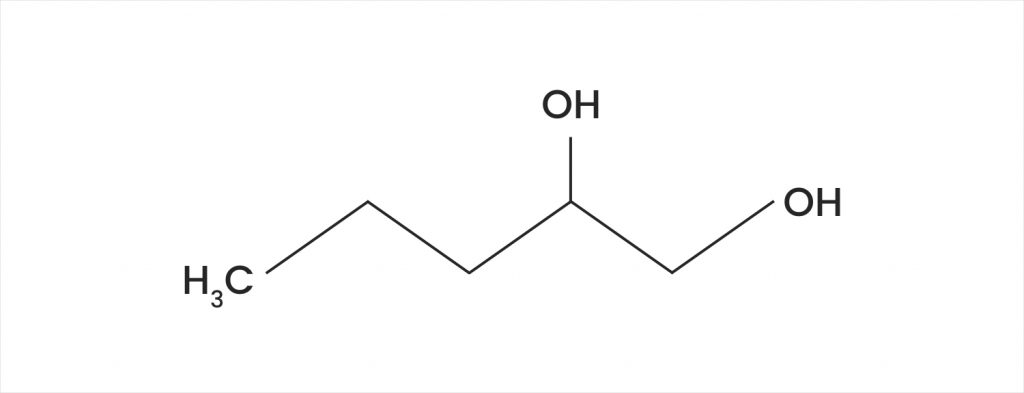What is Pentylene Glycol?
Pentylene glycol is part of the 1,2-glycol family of ingredients. The 1,2-glycols are characterized by the presence of two hydroxyl or alcohol groups on the first and second attachment points along the carbon chain. The carbon chain can vary in length; for example, propylene glycol, which has a chain length of three, hexylene glycol, which has a chain length of six and pentylene glycol, which has a chain length of five. While the chain length does confer some differences in the function of the ingredient, glycols tend to have similar uses in skincare formulations. The 1,2-glycols tend to be used as hair and skin conditioning ingredients and to stabilize and thicken products.
Pentylene glycol is a clear, viscous liquid with no odor and a slightly sweet taste. It is a hydrophilic ingredient, which means that it binds well to water. This characteristic makes pentylene glycol a great ingredient to emulsify and thicken products. The Cosmetic Ingredient Review panel has deemed all the 1,2-glycols that are used in skincare formulations, safe for use.
12 Skincare Ingredients You May Want to Avoid
Pentylene glycol is usually synthetically derived; however, it was initially obtained from plant-based sources such as sugar beet juice. Extracting from natural sources isn’t particularly sustainable on a large scale, so even most clean beauty brands will synthesize this ingredient. In most formulations, the concentration of pentylene glycol will range from 0.001-5%. Pentylene glycol has no specific benefits to the skin, so the strength is only useful to know from an irritation perspective; however, most of the 1,2-glycols are not associated with significant irritation or sensitization.

Pentylene glycol
the good: Pentylene glycol helps to stabilize and thicken products.
the not so good: It can cause minor irritation to the eyes and skin in some people. However, this reaction is rare.
Who is it for? All skin types except those that have an identified allergy to it.
Synergetic ingredients: Works well with most ingredients.
Keep an eye on: It can also be referred to by the names 1,2- dihydroxypentane, 1,2-pentanediol, and pentane-1,2-diol.
What Are The Benefits of Pentylene Glycol?
Conditioning and thickening
Pentylene glycol is utilized in formulation thickening, helping to produce a smooth, hydrating feeling product. Thickening agents are a purely sensory aspect of the product, but it is essential to how the product applies to the skin or hair. 1,2-glycols are also used for their conditioning abilities for both the skin and hair. Pentylene glycol also has the added benefit of acting as a preservative, which minimizes the need to add other preservatives to formulations.
Antimicrobial and Preservative
There is some ongoing research into 1,2-alkanediols, which is a subgroup that includes some 1,2-glycols. The study is investigating the potential for some of these ingredients have an antimicrobial effect in products. This research seems to suggest that pentylene glycol may have this property, which may explain its ability to work as a preservative. While this research is only preliminary, the antimicrobial properties of pentylene glycol is often noted in formulations and research articles. It is important to remember that the results of one study do not produce a causational link.
Is Pentylene Glycol Safe?
Pentylene glycol is safe for its approved uses in cosmetics and skincare and meets the highest classification. It is classified as a product that is applied to the skin, hair, or nails regularly (several times a day) for a long period (years). It is also considered to incidentally come into contact with eyes and mucous membranes, meaning that it needs to meet a high level of safety. Pentylene glycol meets these safety requirements. Pentylene glycol does not have any evidence to suggest toxicity or carcinogenicity.
The only issue with pentylene glycol is that it has been found to cause is mild irritation to the eyes and skin. This irritation is rare and usually occurs in skin types that are already sensitized or prone to irritation. If you have sensitive skin that is prone to irritation, consult your dermatologist about whether this ingredient is best for you.
Other 1,2-glycols:
There are 16 other 1,2-glycols, only four are used in skincare. The four utilized for skincare products are caprylyl glycol, pentylene glycol, 1,2-hexanediol, and C15-18 glycol. The other 12 are arachidyl glycol, cetyl glycol, hexacosyl glycol, lauryl glycol, myristyl glycol, octacosanyl glycol, stearyl glycol, decylene glycol, 1,2-butanediol, C14-18 glycol, C18-30 glycol, and C20-30 glycol.
References:
Johnson, W et al. 2012. ‘Safety Assessment of 1, 2-Glycols as Used in Cosmetics’, International Journal of Toxicology, vol. 31, iss. 2, pp. 147s-168s.
Steiner, A, Kugarajan, K, Wullimann, M, Ruty, B. & Kunze, G, 2017. ‘Margin of safety of pentylene glycol using measurements of cutaneous absorption and volatility’, Regulatory Toxicology and Pharmacology, vol. 87, pp. 106-111.
Cosmetic Ingredient Review, 2011. ‘Caprylyl Glycol’ CIR Expert Panel Meeting June 27-28, 2011.
Pillai, R, Schmaus, G, Pfeiffer, A, Lange, S & Trunet, A, 2013. ‘1, 2- Alkanediols for Cosmetic Preservation’, Cosmetics and Toiletries.







